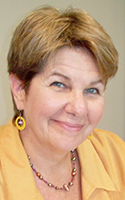Associated Press Stylebook changes language rules dealing with addicts. Health professionals say it’s a step to help de-stigmatize substance dependency
By Deborah Jeanne Sergeant

For many years, “person first” language has been the standard among media members and professionals in mental health, such as “person with disabilities” instead of “disabled person.” The Associated Press’ 2017 Stylebook, journalists’ go-to book for writing and language standardization, has extended person first language to addicts — make that “persons with addictions.” The exceptions include the names of organizations or quotations. While it may seem an inconsequential use of phrases, words are powerful and they can affect treatment.
Jennifer Faringer, director of De Paul’s National Council on Alcoholism and Drug Dependence in Rochester, said that the change reflects a desire by professionals to de-stigmatize substance dependency in the hopes of promoting treatment.
“There is hope for recovery, but it’s a disease process,” Faringer said. “It’s not a moral or behavioral deficiency.”
She said that although there’s an initial choice to use drugs, the chemical changes in the brain make substance dependency more than a matter of willpower. Faringer believes that attaching words such as “junkie,” “addict,” “druggie,” and “dirty/clean” to those who struggle with substance abuse disorders unnecessarily shames them. For some, that could delay life-altering or even life-saving treatment. For those looking for counseling services, sites like thrivefamilycounseling.com/locations/league-city/ may be able to provide the necessary support and guidance.
Many group treatment programs begin with participants introducing themselves and calling themselves the very disparaging terms Faringer and other professionals denounce; however, she said that acknowledging the problem is the first step toward treatment.
“This doesn’t hold someone harmless,” Faringer said. “You have to admit you have a problem and you need help, but like you’d need help with any other disease, like diabetes. It’s understanding that it’s a disease and it’s treatable.”

Patrick Seche, director of Strong Recovery Addiction Psychiatry Division and clinical chief chemical dependency at UR Medicine, said that many patients, when referring to themselves, “overwhelmingly use the negative language. There’s quite a bit of education that we need to do as an organization, as a field and as health care providers. The existing negative language is what they know.”
Seche said that as patients progress through recovery, they tend to use more positive words.
He hopes that shifting to more positive language will help patients seek treatment sooner than later, in a drug detox near me, after more damage has occurred.
“It gives a certain dignity back to the patient,” Seche added. “Addiction takes people places that minus that addiction they never would have gone. A loss of dignity happens in that process.”
He feels that eliminating stigma-charged words will help frame substance abuse “as a chronic disease instead of a moral failing,” he said.
Seche said the effect extends to providers as well, since using certain language can result in a more professional and compassionate connection with patients.
One of the major shifts in treatment of substance abuse is moving from the behavioral model to the health model, according to Chris Pulleyn, licensed marriage and family therapist in private practice in Rochester.

She said that since professionals don’t completely understand the issue, and have only recently identified a biological element, it will take time to adjust to the new language.
“I can’t say that it would make a huge sea change in public perception because there will always be people who think people with addiction are lazy or don’t have enough willpower,” Pulleyn said.
Brigid Sboto, licensed marriage and family therapist practicing in Rochester, said that the change in perception through different words will happen very slowly but that it’s helpful in conveying sensitivity to a complex and deeply-rooted issue.
“Any mental health diagnosis is so complicated for the average person to understand,” Sboto said. “We’re given a lot of misinformation.”
